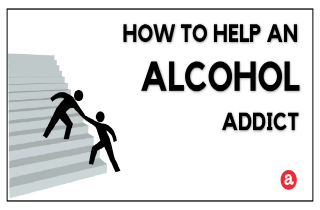Are you or a loved one struggling with alcohol addiction? Do you feel as if alcohol is controlling your life?
You are not alone. In fact, alcohol misuse is a global phenomenon, putting at risk the lives of many who consume alcohol or those are surrounded with people who do. How can you address these problems and help someone you think may be an alcoholic?
Here we review what to do in order to help an alcohol addict. We’ll cover the main types of treatments that are available and refer you to medical professionals who assess and treat alcohol use disorders. More here and we invite you to ask additional questions or share your experience about the effects of alcohol at the end.
First, you must claim the problem
Acknowledging the existence of a drinking problem is a prerequisite for getting help. Addressing the problem may be difficult and require outside help from a doctor, addiction specialist, or even a psychotherapist with experience in such interventions. This is because offering help is likely to bring about a plethora of obstacles such as objection, denial, anger, resistance and so forth. Staying persistent is crucial in order to get the alcohol addict accept the help they need.
Help an alcohol addict quit
Once an alcohol addict recognizes the drinking problem and consents to undergo recovery, the next thing s/he should do is to assess alcohol dependence and remove alcohol from the body. During a process called withdrawal, the body gets rid of the accumulated ethanol and its toxins, a process clinically known as detox.
A typical detox lasts for 3-7 days and it’s accompanied by a set of predictable symptoms that occur when the alcohol leave the body. Symptoms usually occur as early as 6-8 hours after the last drink, reaching a peak by 24-72 hours, and in some more serious cases subside after few weeks. The most common initial withdrawal symptoms include:
- anxiety
- nausea
- restlessness
- tremor
- trouble sleeping
Some people may get away with only these symptoms, while others (9-10% of cases) may experience more serious withdrawal symptoms such as:
- disorientation
- fever
- hallucinations
- mental confusion
- profuse sweating
- rapid breathing
- tremor
The intensity of alcohol withdrawal symptoms can go from relatively mild to pretty intense and will depend on how heavy of a drinker the person is. However, not here that ALL CASES OF ALCOHOL DETOX REQUIRE MEDICAL SUPERVISION. This is because alcohol dependence can trigger serious complications such as seizures or delerium tremens…which can be treated. Therefore, the safest way to detox from alcohol is to check in at a detox clinic where medical professionals can assist in reducing the intensity of the symptoms, help prevent complications, and address possible relapse.
Help alcohol addict friend
After a period of physical stabilization, what follows is another critical period which requires solid psychological treatment. The goal of such a treatment is to address the root of the drinking problem and change the person’s behavior towards alcohol. Main therapies which help treat alcohol addiction include behavioral and psychological interventions. Treatments can include:
- 12 Step Facilitation
- Behavioral Cue Exposure
- Behavioral Self-Control Training (BSCT)
- Contingency Management
- Mindfulness Meditation
- Motivational Enhancement Therapy
- Psychoeducational Interventions
- Self Help Based Treatments
Adopting a different attitude towards drinking and remaining sober for a lifetime can be difficult, but is achievable with these strategies along with support and care from close ones. Understanding the reasons behind drinking and the factors that lead to alcoholism are essential for preventing relapse. The most commonly practiced psychological treatment for alcohol abuse also includes Cognitive Behavioral Therapy (CBT) which targets the triggers for alcohol use and provides skills training to cope with alternatives. CBT treatment for alcohol abuse includes the following strategies:
1. Identification of intrapersonal and interpersonal triggers for relapse
2. Training for coping skills training
3. Training for alcohol refusal skills
4. Functional analysis of alcohol use
5. Promoting non-alcohol related activities
Self-help alcohol addiction
It is a good sign if you know you need help for alcohol addiction. It means that you have accomplished the essential and most important part, i.e. acknowledging the existence of your drinking problem. So what can you do when you ready to seek self- help for an alcohol problem?
You can first seek a medical professional(s) opinion to in order to determine your level of addiction and propose the safest way to detox. It is not recommended that anyone dependent on alcohol detox alone, but if you insist, it is better to taper down the dose instead of quitting abruptly. In some cases cold, turkey detox from drinking alcohol could be dangerous and lead to fatality. In an ideal situation, your general practitioner will check you and refer you to a detox clinic where you would be monitored during the detox stage and provided with information regarding follow up treatment. Also, make sure you have the support from close people and you stay away from alcohol and other abusive substances
Get help alcohol addiction
Fortunately, The United States abounds in addiction treatment facilities and professional people who can help you recover from you alcohol addiction. You can get help for alcohol addiction by seeking help from:
- Addiction treatment centers
- Clinical psychologists/psychiatrists
- Detox clinics
- Social workers
- Support groups
Check the national database of the Substance Abuse and Mental Health Administration website and choose a facility that will best suit your individual requirements, or consult a medical professional to recommend you one.
Helping a alcohol addict questions
Do you still have questions about helping an alcohol addict get treatment? Feel free to post your questions in the comments section below or give us your feedback. We will try to respond to all legitimate inquiries in a personalized and timely manner.









Related Posts